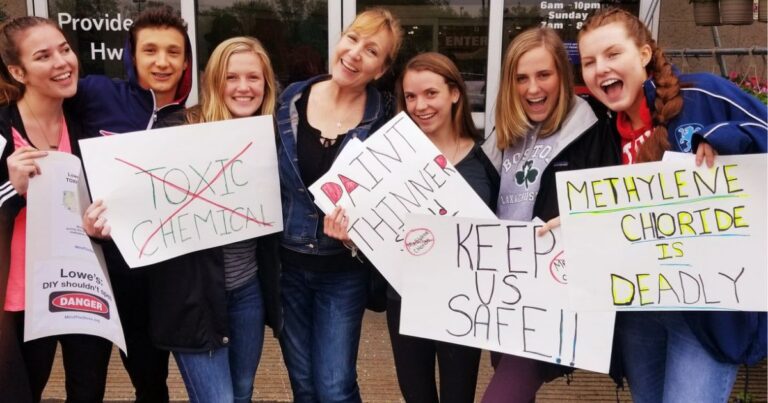WASHINGTON – The toxic chemical decabromodiphenyl ether (decaBDE), a brominated flame retardant that has been in the crosshairs of a coalition of states, scientists and public health professionals for nearly a decade, will be largely phased out of the United States marketplace, according to an announcement today from the U.S. Environmental Protection Agency (EPA). EPA has obtained commitments from decaBDE’s two U.S. manufacturers and largest U.S. importer to stop producing, using, and importing the chemical by 2013. The phaseout represents a victory for public health, wildlife protection and the environment.
“This victory is especially gratifying considering the nefarious tactics used by the bromine chemical manufacturing industry to defeat efforts to restrict decaBDE at the state level,” said Charity Carbine, Environmental Health Advocate with the Vermont Public Interest Research Group. “In Vermont, Oregon, Maryland and California, for example, they presented an industry front group called Citizens for Fire Safety as a legitimate grassroots group working for public health,” she said.
Despite fear and misinformation spread by the bromine industry to groups and associations made up of people of color that a ban on decaBDE would be hazardous to their health, organizations working to support low income and communities of color are applauding EPA’s action as one way to mitigate the disproportionate burden of chemical exposure on such communities. “This is a victory for environmental justice organizations who have tried to push the legislature to ban deca in the face of apparent race baiting tactics by the bromine industry,” said Dr. Mark Mitchell, Executive Director of the Connecticut Coalition for Environmental Justice.
According to EPA’s announcement, the companies have committed to phase out decaBDE from most uses in the United States by December 31, 2012, and to end all uses by the end of 2013. EPA said that it will encourage other minor importers of decaBDE to join its decaBDE phase-out initiative.
“Based on extensive laboratory animal testing, DecaBDE is highly likely to disrupt normal human development,” said Ted Schettler MD, Science Director of the Science and Environmental Health Network. “A 2009 study from the Institute of Public Health at the University of Copenhagen found deca BDE at higher concentrations than any other PBDE in the placentas of 50 women in Denmark, which is consistent with a previous study done in Spain. While we do not know the levels of deca BDE in placental tissue of American women, we have enough information about the toxicity of deca in the earliest stages of life to prohibit its manufacture, use and re-use in recycled products.”
A recent biomonitoring project to identify chemicals in the bodies of health professionals found polybrominated diphenyl ethers in all participants tested. This confirms previous investigations done by the Centers for Disease Control and Prevention, other government agencies, and non-profit organizations, which have found decaBDE in the bodies of people and wildlife. “When you find out deca is in your body it is hard to deny, minimize, rationalize or justify its presence,” said George Lundgren, MD, a Minnesota family practice physician. “While it is disturbing to know the only body I have is permanently contaminated with unnecessary toxic chemicals, I applaud the federal government for taking this action to better protect future generations.”
While many are applauding the EPA agreement as an important step to address decaBDE, there are limitations to the agreement. “The agreement falls short of ensuring that companies will guarantee replacement chemical flame retardants are less problematic,” said Arlene Blum, Executive Director of the Green Science Policy Institute. She added, “We must hope that the decabrominated diphenylethane (DBDPE ) won’t be a major substitute for decabrominated diphenylether. DBDPE is very similar in structure to decaBDE and may be as persistent and bioaccumulative.”
Kathy Curtis, PBDE Collaboration Coordinator for Environmental Health Fund added, “The agreement exempts recycled content, thereby ensuring that decaBDE continues to enter our homes, and our bodies, for years if not decades to come. The federal government should take further action to ensure that deca and other toxic chemicals be eliminated from the products we use every day.”
The agreement to phaseout decaBDE, which has been manufactured and sold via consumer products and other items for many years, also exposes the gaps in the 33-year old federal Toxic Substances Control Act, which has allowed the production and use of toxic chemicals without adequate safety evaluations.
“The EPA’s decision to protect Americans from this toxic chemical brings us one step closer to a toxic-free, healthier future for our kids. Now we need to move beyond addressing one chemical at a time and protect people from chronic diseases like asthma and cancer by overhauling the regulatory system that allowed this toxic chemical to be legal in the first place,” said Andy Igrejas, Campaign Director for the 100+ member coalition Safer Chemicals, Healthy Families. Safer Chemicals, Healthy Families is calling for an update of the Toxic Substances Control Act as Congress’ New Year’s resolution for 2010.
David Levine, Co-founder of the American Sustainable Business Council, a group of twelve networks representing 40,000 businesses, said, “This agreement provides businesses with the opportunity to do what they do best, to innovate and create new markets that boost sustainable products to create a healthy and vibrant economy.”
Resources:
- http://www.isitinus.org/chemicals.php
- http://www.psr.org/assets/pdfs/hazardous-chemicals-in-health-care.pdf
- http://www.ncbi.nlm.nih.gov/pmc/articles/PMC2367657/
- http://greensciencepolicy.org/publications/



